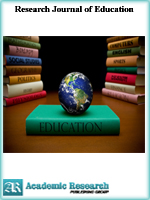Research Journal of Education
Online ISSN: 2413-0540
Print ISSN: 2413-8886
Print ISSN: 2413-8886
Quarterly Published (4 Issues Per Year)

Archives
Volume 3 Number 10 October 2017
Promoting Best Practices in Secondary Schools through Teacher Commitment
Authors: Habibat Abubakar Yusuf ; Ismail Hussein Amzat ; Khaliza Binti Saidin
Pages: 139-142
Abstract
Teachers constitutes the most important asset in teaching profession, thus, their readiness and interest towards work is important to the educational development. This study adopted a quantitative research of the survey type to provide a numeric description of portion of the population. The perception of teachers towards work and teaching profession were examined and the findings reveal that, teachers are willing to show more commitment to their work and the teaching profession. The study recommends that stakeholders should give support to teachers towards fulfilling the school objectives.
A Qualitative Study of Excellent Teacher,s Beliefs of Good Teacher
Authors: Ernest Lim Kok Seng ; Sharleena Jaelyn A/P S.Kunaratnam ; Lau King Lang
Pages: 134-138
Abstract
The number of students enrolling at International schools in Malaysia is increasing each year. A number of parents are paying substantial amount of money in order to seek for a quality education for their children. However, the quality of a teacher is not always easy to measure, particularly the personality, attitudes and beliefs of a teacher. There have been numerical quantitative researches on the quality of a teacher but it is argued that a qualitative approach would add to existing knowledge by providing deeper insights and from a different point of views. The purpose of the present study was to explore excellent teachers’ views of a good teacher through individual in-depth interviews. Six excellent teachers from different schools were selected for this study. Various themes emerged from the interviews, some of which have not yet been uncovered in past research investigating quality teacher. The findings provide evidence that teacher’s personality, student-centred approach, nurturing students, moral and social awareness, level of professionalism and effective management skills are the elements leading to the establishment of a good teacher. This study also provides support for the employment of qualitative methods in the study of a good teacher.
Assessment of the Contributions of Community Based Management Organizations in Promoting Literacy in Ube Schools in Kaduna State
Authors: Hanna Onyi Yusuf ; Bawa Ribah Mairiga
Pages: 128-133
Abstract
This study assessed the contributions of Community Based Management Organizations in promoting Literacy in UBE schools in Kaduna State. The study was carried out with the objectives to assess the contributions of community based management organizations in promoting literacy in UBE schools in Kaduna State, and to find out the relevance of literacy towards community development. The study adopted survey research design with the target population of 4225 headmasters, 411 principals and 5301 teachers in UBE schools in Kaduna State. A sample size of 497 respondents was sampled from the entire population using random sampling technique which consisted of 211 headmasters, 21 principals and 265 teachers. A close ended questionnaire tagged “Contributions of Community Organizations in Promoting Literacy Questionnaire” was used for data collection. The instrument was validated by three experts of the rank of senior lecturer in Measurement and Evaluation, English language and Curriculum. The reliability level of 0.85 was obtained using Cronbach alpha technique. The researcher with the help of three research assistants administered the questionnaire to the respondents. In answering the research questions, frequency counts, mean and standard deviation were used. while Kruskal-Wallis was used to test the formulated hypotheses at 0.5 level of significance. Finding revealed that community based management organizations contributed in promoting literacy in UBE schools in Kaduna State, and that literacy is relevant and play crucial role in community development. The study concluded that community based management organizations contributed in areas such as advocacy on enrolment, provision of textbooks, notebooks, biros, charts, maps, pictures, flashcards and so on, in promoting literacy in UBE schools in Kaduna State. Recommendations were put forward among others that community based management organizations should contribute more to the production and distribution of literacy and other instructional materials for UBE schools in Kaduna State. This will help equip pupils with functional literacy skills.
Curriculum Design, Implementation and Evaluation of Chemical
Authors: Di Wu ; Shuxia Ren ; Xiuyan Pang
Pages: 116-127
Abstract
Curriculum design can be understood as that the sum of a teacher’s personal efforts in preparing and finishing each lesson, which normally includes design, implementation and evaluation. To ensure teaching efficiency: (1) the teacher should elaborately design each lesson basing on teaching objectives; (2) actualize it with feasible teaching method; (3) inspect and assess the teaching effectiveness according to appropriate method. In this paper, the curriculum design, implementation and evaluation for a 72hour Chemical Engineering Basic course was investigated and discussed. It included the main knowledge units of course basic methods, fluid flow and machine, heat transfer process, mass transfer process, gas absorption, distillation, reactor flow Model, design and calculation. Teaching practices have testified that the careful planning, thorough implementation and scientific assessment cannot only obviously improve teacher’s teaching level, but also ensure teaching quality.



